2014 Report Card: FDJ.fr
French squad reliant on the happy few for success
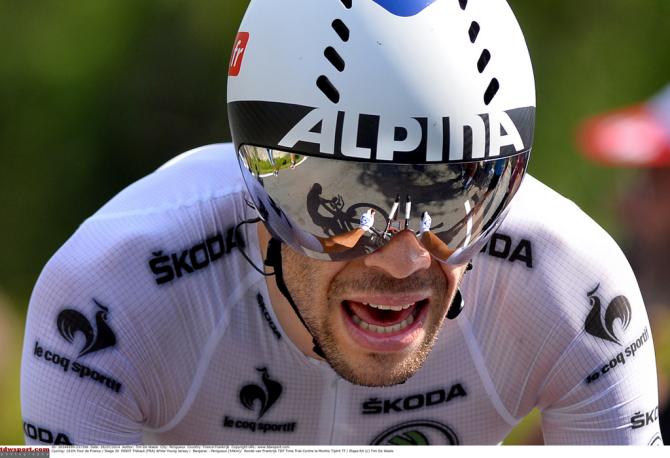
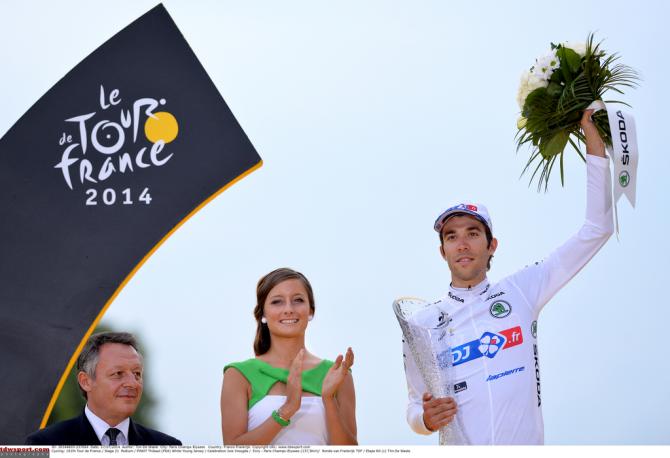
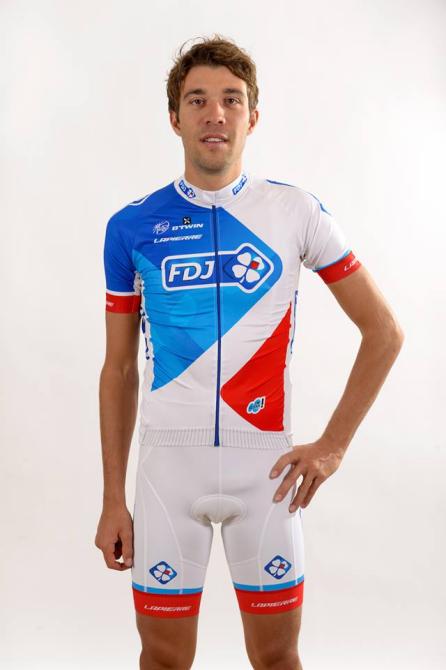
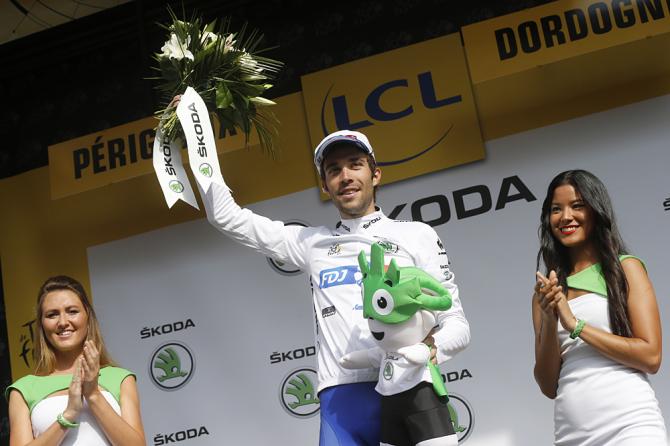
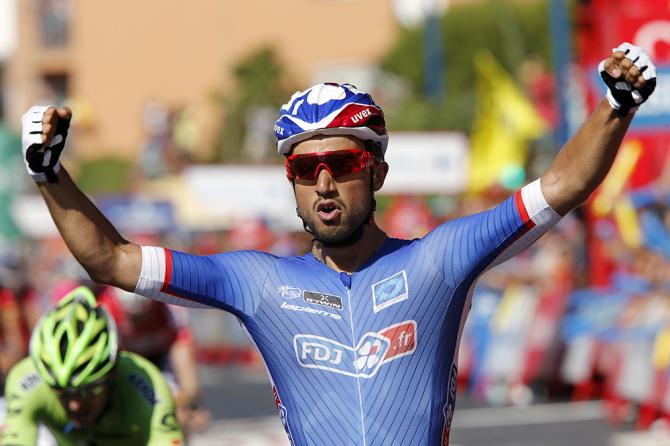
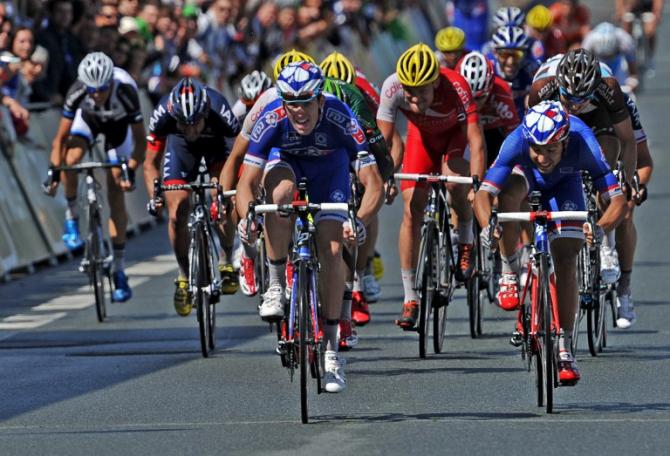
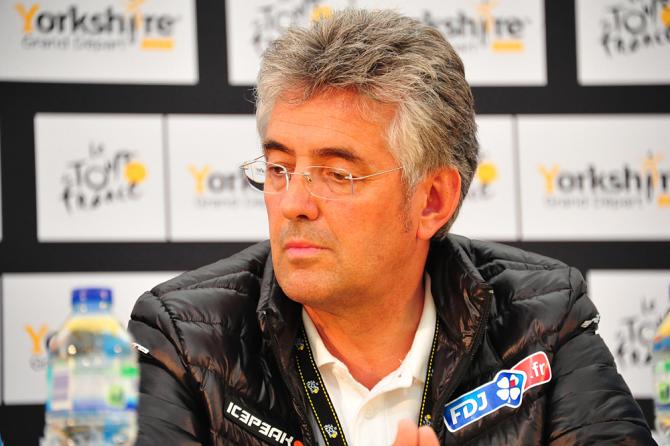
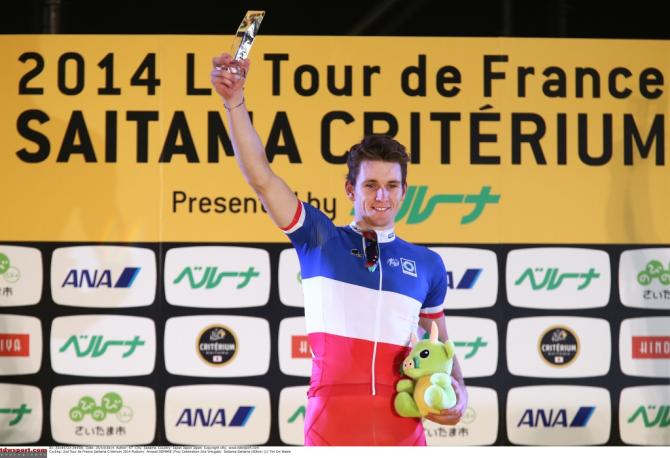
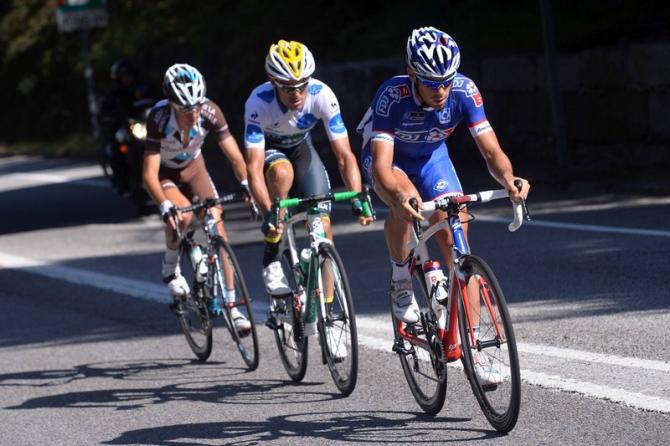
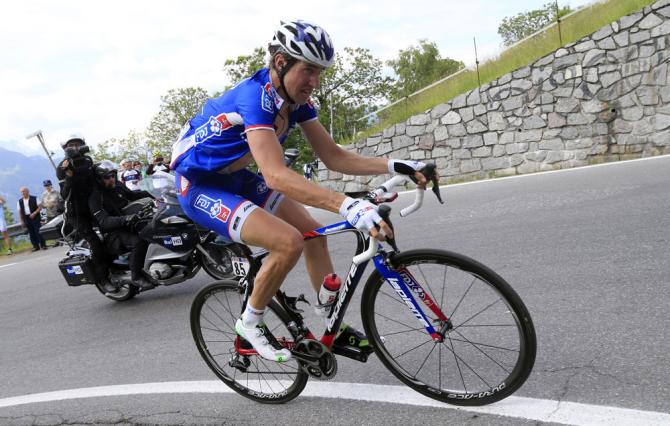
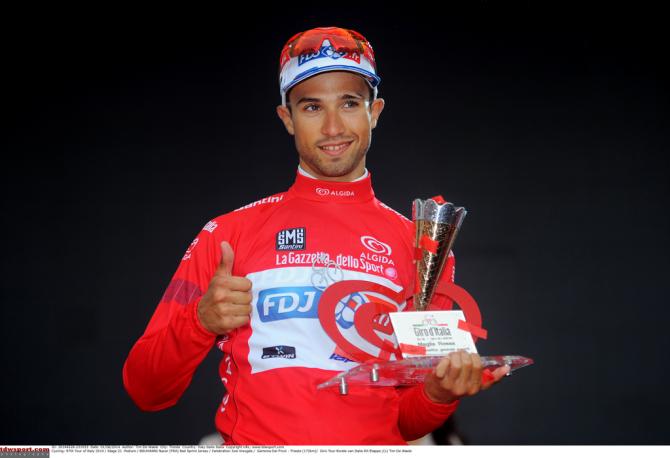
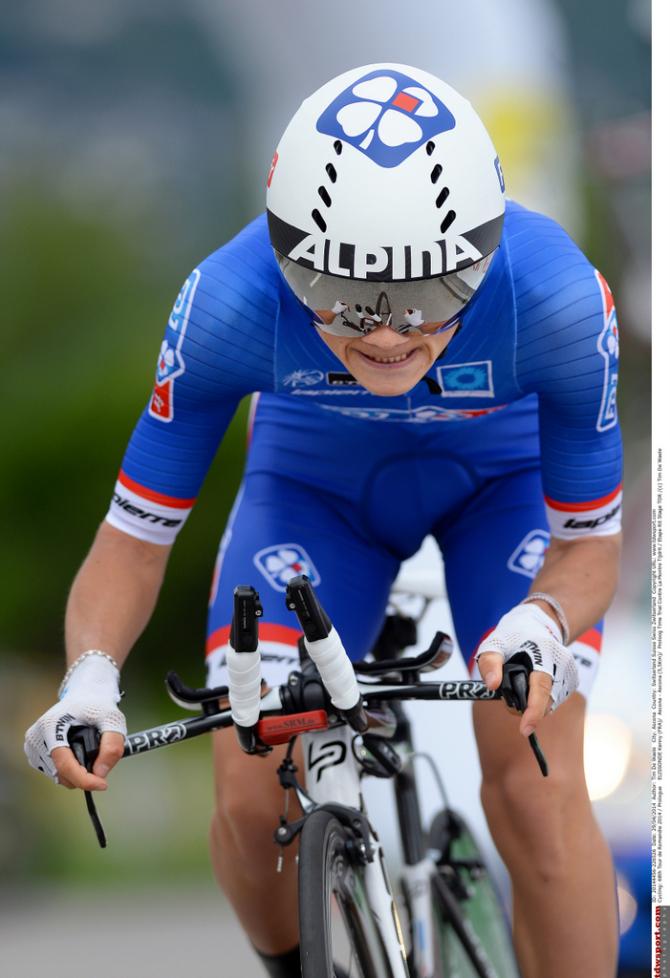
FDJ.fr
WorldTour ranking: 16th (Up one place from 2013)
Win count: 28 (Down from 33 in 2013)
Top riders: Thibaut Pinot (32nd), Arthur Vichot (40th), Nacer Bouhanni (45th)
As the 2014 season began, Marc Madiot set his FDJ.fr team the lofty goal of landing more than 35 victories over the course of the year. Despite the best efforts of Nacer Bouhanni and Arnaud Démare, his charges fell a little short of that target but Thibaut Pinot's effervescent third place finish at the Tour de France means that the campaign cannot be deemed anything other than a success for FDJ.
If France is, as Madiot claimed earlier this month, the centre of the cycling world, then La Grande Boucle is his team's lodestar. Certainly, Pinot's podium finish – the first by a FDJ rider in the team's eighteen-year history – seems proof enough for Madiot that his squad is charting the right course through the choppy waters of the WorldTour, despite yet another year plumbing the depths of the season-long rankings.
Pinot's disastrous 2013 Tour meant that he benefited from entering this year's race with considerably less external pressure than he had done twelve months previously. After emerging unscathed from the crash-strewn opening week, his confidence grew exponentially thereafter, as testified by sparkling showings at La Planche des Belles Filles and Chamrousse.
The early abandons of Chris Froome and Alberto Contador undoubtedly helped Pinot's march to the final podium, but that should not diminish his achievement. Pinot was well worth his position among the very best of the rest behind the untouchable Vincenzo Nibali. He limited the damage on a pair of relative jours sans, he delivered a very solid showing in the final time trial and, perhaps most impressively of all, he kept his head when so many about him in the French media were inclined to lose theirs.
The one blot on Pinot's season was the lack of a victory of any description and for all his consistency in WorldTour stage races over the year, he was rarely close to doing so. He did travel to the Vuelta a España expressly to break that duck but a bout of illness ended his Spanish campaign prematurely.
The success of Démare and Bouhanni
Get The Leadout Newsletter
The latest race content, interviews, features, reviews and expert buying guides, direct to your inbox!
Instead, FDJ were almost wholly reliant on their two fast men for wins – all but two of the team's 28 victories came from Démare and Bouhanni. Their remarkable haul of bouquets – 15 for Démare and 11 for Bouhanni – was proof that internecine strife is not always mutually destructive, although it was inevitable from the outset that FDJ would no longer be big enough for both of them in 2015.
Bouhanni and Démare's intense rivalry dates back to their amateur days and tensions were such that they competed together just once in 2014, at the French championships, where Démare vindicated his selection for the Tour team by beating his teammate in the sprint. Already disappointed not to get the nod for Milan-San Remo, Bouhanni proved his point by racking up a hat-trick of stages at the Giro d'Italia, a brace at the Vuelta and climbing with such facility that French coach Bernard Bourreau had little option but to make him a leader at the Worlds, where he was a respectable 10th.
For his part, Démare was strong in the cobbled classics, finishing second at Gent-Wevelgem and a battling 12th at Paris-Roubaix, before catching fire in May with a storming sequence of wins at Dunkirk and Picardie, coincidentally just as Bouhanni was laying waste to sprints at the Giro d'Italia. While his Tour debut was a disappointment, Démare bounced back in the autumn with another run of victories along the Franco-Belgian border – just as Bouhanni was shining at the Vuelta.
Elsewhere, Johan Le Bon showed up well on the cobbles and Jérémy Roy was typically generous in his efforts throughout the year, although Arthur Vichot will have been disappointed not to have built on his stage victory at Paris-Nice. Among the team's roster of climbers, Alexandre Geniez picked up a solid 13th place at the Giro, but after an impressive 2013, Kenny Elissonde fell short of expectations this time around.
What to expect in 2015: The Tour will once again be the centre-piece of Pinot's season, particularly given that ASO seems to have designed the parcours with his talents very specifically in mind. There are just 14 kilometres of individual time trialling and a surfeit of summit finishes, and so long as Pinot survives an atritional first week, he ought to shine once again.
With Contador, Froome, Nibali and Nairo Quintana all set to line up in France, however, it is entirely conceivable that Pinot could perform better at next year's Tour and still fail to match his podium finish of 2014.
The Frenchman is unlikely to be deterred. His meagre palmarès as a professional is due in no small part to his longstanding preference for testing himself against the best in WorldTour races rather than looking to pick off wins elsewhere, and a Tour against all of Big Four will be a welcome measure of his progress. Their presence might also alleviate some of the expectation that will surround his build-up, although in any case, Pinot seems to have already drawn considerable lessons from his contrasting 2012 and 2013 Tours.
Following Bouhanni's departure for Cofidis, Démare will carry the full burden of responsibility for keeping FDJ's win count ticking over throughout the season, and he will look for a maiden Grand Tour stage win. Before that, the man from Beauvais will lead a youthful and improving FDJ team in the cobbled classics. 2015 might prove a year too soon in his development to win Paris-Roubaix, but Gent-Wevelgem is certainly within reach for Démare – and, depending on the route, perhaps even Milan-San Remo. The fact that Bouhanni has designs on both races will provide added motivation, lest it were needed.
Outside of the two young leaders, FDJ will hope for greater consistency from Vichot and a re-affirmation from the likes of Geniez, Elissonde and Arnauld Jeannesson, as well as a wider spread of victories. In that regard, Madiot perhaps faces something of an existential decision – does he want to bolster FDJ's wins column by picking up victories in Coupe de France races or will scoring WorldTour points take precedence?
With a reduced top flight due to come into effect in 2017, the WorldTour ought to be prioritised but Madiot has set himself up very publicly as the defender of smaller French races (and, indeed, seems to have anointed himself as the Académie française's unofficial cycling immortel) and scarcely hides his disdain for the UCI rankings.
Yet despite Madiot's traditionalist stance (amid the jingoism, he makes some arguments of real merit), there is a very progressive element at FDJ, personified by forward-thinking coaches such as Frédéric Grappe and Julien Pinot. If any team can combine survival in the brave new world with saving some of the charm of the old, it ought to be FDJ. Although it should be noted that the team came up short on both counts in 2014. FDJ contrived to win just a single Coupe de France race this season and then finished third from bottom in the WorldTour for good measure. They must do better in 2015.
Best signing: The acquisition of Steve Morabito is perhaps not exactly a glamour signing but it's certainly a clear sign of FDJ's growing ambitions. The Swiss rider was quietly and consistently impressive in support of Cadel Evans during his time at BMC, and he will now be asked to replicate those selfless displays in the service of Pinot. A fine climber, Morabito can also look after himself – and his leader – outside of the big mountains and should prove a solid addition to the Tour team.
Biggest loss: Démare ultimately clocked up more victories and won the head-to-head battle at the French championships, but Nacer Bouhanni was still FDJ's best sprinter in 2014. In claiming five Grand Tour stages, Bouhanni confirmed his arrival at sprinting's top table, while his ongoing improvement on the climbs suggests that he can develop into a rider capable of competing in an even wider range of classics than Démare.
Keeping two sprinters happy in the same team has historically been nigh-on impossible, of course – ask Cavendish and Greipel, or Cipollini and Baffi – but one senses that FDJ will rue allowing Bouhanni to leave, financial demands notwithstanding. He had become an increasingly marginalised figure at FDJ over the past two years, yet despite the pervading atmosphere, he put together a fine body of work. With the full backing of Cofidis – modest though that may be – Bouhanni could come back to haunt FDJ. In any case, the Bouhanni-Démare duel, fought largely by proxy this year, is now out in the open and will be one of 2015's most compelling storylines. In that sense, FDJ's loss is perhaps cycling's gain.
Man to watch: Johan Le Bon was already one to watch as a junior, when he secured the European and World titles in quick succession back in 2008, and since joining FDJ from Bretagne-Schuller last year, he has begun to show sustained flashes of his potential at the highest level. A strong rouleur, Le Bon was hugely impressive in an especially tough edition of Omloop Het Nieuwsblad in February and went on to ride well in support of Démare throughout the spring. The Breton's devotion to the pavé is such that he rented an apartment in Oudenaarde for two months last spring on the advice of directeur sportif Martial Gayant. "If you want to race in Belgium, you have to live like the Belgians," he reasoned. Expect significant progress from Le Bon next spring – and, indeed, from FDJ's classics unit as a whole.

Barry Ryan was Head of Features at Cyclingnews. He has covered professional cycling since 2010, reporting from the Tour de France, Giro d’Italia and events from Argentina to Japan. His writing has appeared in The Independent, Procycling and Cycling Plus. He is the author of The Ascent: Sean Kelly, Stephen Roche and the Rise of Irish Cycling’s Golden Generation, published by Gill Books.